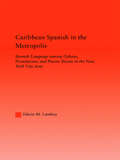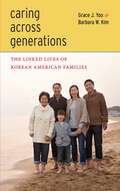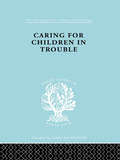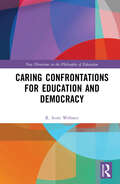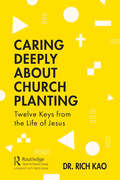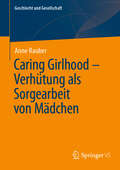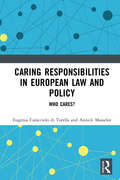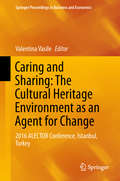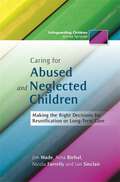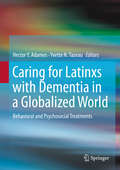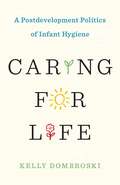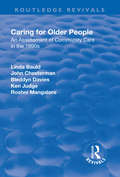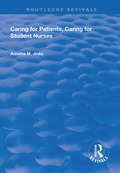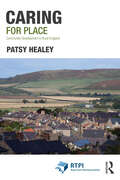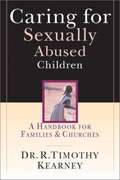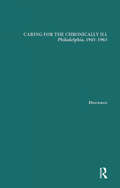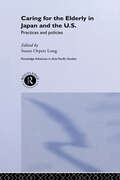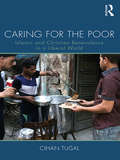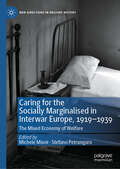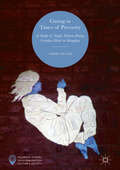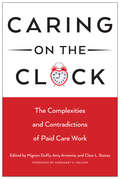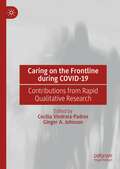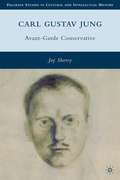- Table View
- List View
Caribbean Racisms: Connections and Complexities in the Racialization of the Caribbean Region (Mapping Global Racisms)
by Ian Law Shirley Anne TateThis book identifies and engages with an analysis of racism in the Caribbean region, providing an empirically-based theoretical re-framing of both the racialisation of the globe and evaluation of the prospects for anti-racism and the post-racial.
Caribbean Spanish in the Metropolis: Spanish Language among Cubans, Dominicans and Puerto Ricans in the New York City Area (Latino Communities: Emerging Voices - Political, Social, Cultural and Legal Issues)
by Edwin M. LamboyThis study focuses on first- and second-generation Cubans, Dominicans and Puerto Ricans living in the New York City area. In particular, the author creates a sociolinguistic profile of these cohorts and evaluates their attitudes towards Spanish and English, their use of these languages and their linguistic skills based on generation and ethnic factors.
Caring Across Generations: The Linked Lives of Korean American Families
by Grace J Yoo Barbara W KimMore than 1.3 million Korean Americans live in the United States, the majority of them foreign-born immigrants and their children, the so-called 1.5 and second generations. While many sons and daughters of Korean immigrants outwardly conform to the stereotyped image of the upwardly mobile, highly educated super-achiever, the realities and challenges that the children of Korean immigrants face in their adult lives astheir immigrant parents grow older and confront health issues that are far more complex. In Caring Across Generations, Grace J. Yoo and Barbara W. Kim explore how earlier experiences helping immigrant parents navigate American society have prepared Korean American children for negotiating and redefining the traditional gender norms, close familial relationships, and cultural practices that their parents expect them to adhere to as they reach adulthood. Drawing on in-depth interviews with 137 second and 1.5 generation Korean Americans, Yoo & Kim explore issues such as their childhood experiences, their interpreted cultural traditions and values in regards to care and respect for the elderly, their attitudes and values regarding care for aging parents, their observations of parents facing retirement and life changes, and their experiences with providing care when parents face illness or the prospects of dying.A unique study at the intersection of immigration and aging, Caring Across Generations provides a new look at the linked lives of immigrants and their families, and the struggles and triumphs that they face over many generations.
Caring Children Troubl Ils 140 (International Library Of Sociology And Social Reconstruction)
by Julius CarlebachFirst published in 1998. Routledge is an imprint of Taylor & Francis, an informa company.
Caring Confrontations for Education and Democracy (New Directions in the Philosophy of Education)
by R. Scott WebsterCaring Confrontations for Education and Democracy makes a compelling case for redirecting current practices of education to focus on being educated rather than having an education. The book offers a detailed analysis of how an education for democracy must encourage commitment to important ideals and strengthen the vulnerabilities of people which make them easily manipulated by politicians and the media. It addresses the need for education that focusses on people’s mode of being, so that in addition to becoming knowledgeable and skilful, people develop the disposition that is more appropriate for democratic living. Through embodying this approach of authentic spiritual growth through education, this book explores the idea of caring confrontations and critical reflection to enable personal change and growth. Providing a thoughtful analysis of the role of education in democracy, the book will be of great interest to researchers, academics, and students in the fields of philosophy of education, educational theory and democratic education.
Caring Deeply About Church Planting: Twelve Keys from the Life of Jesus
by Rich KaoThis is a massive work. Rich Kao has prepared an education in a box for future church planters. Having planted six churches, I truly understand the dynamics behind every detail which Rich has written about. I also believe churches will take their staffs through this book to instill and inspire the apostolic passion contained in this book. This could be a game changer. Jerry Daley, Pastor and Church Planter, JerryDaley.com It's been a great honor to plant churches and do apostolic work with Rich Kao in some of the most "impossible" places. In each location Rich brought wisdom and innovation to diverse people groups. This book will help both seasoned church planters and first timers. His twelve keys are brilliant, well proven and most likely what you need to unlock your city and region to bring forth "fruit that remains." Ron Lewis, Sr. Leader, Every Nation NYC; Church planter in 20 nations I have known, respected, and served with Rich Kao for over 20 years. There is not a man I know who is more open to proactively growing in the areas of faith, flexibility, innovation, pioneering, and leadership. These traits, along with his wealth of experience, culminate in this challenging, insightful and impactful book. I would highly recommend this book not only to current church planters and church planters in training, but to anyone called to positions of leadership within Jesus' Church. Ben Goodman, Pastor of Leadership Development, Manna Church; Oversight Team, Truebridge Network Never has the need for church planting been more acute or more necessary. The world around us is beset with problems of every kind—political, social, economic, racial, and moral. The list is endless, and the difficulties are systemic and entrenched. The best minds, institutions, and efforts are being marshaled to address these problems, but are we getting to the root issues? Could it be that the solutions lie elsewhere? Indeed, the greatest reformer to ever live told us the hope we need comes from the church. Yes, the church, as anemic and as irrelevant as it may seem to some (or many). Jesus said of the community He would birth, "You are the light of the world and the salt of the earth" (Matt. 5:13-14). The church, in all its forms, from small to big, whether found in the countryside or in megacities is God’s redeeming force for society, for culture, and for the nations. The church is God’s secret weapon and His change agent for the world. He’s all in on the church. As such the church is God’s organizational servant on the earth. It’s to be an enterprise of the highest quality. It’s to sparkle with kingdom power, love, and truth. As Ephesians 3:10 states, "[God’s] intent was that now, through the church, the manifold wisdom of God should be made known to the rulers and authorities in the heavenly realms." For such a task, outstanding leaders are needed. Great leaders are not just for the arenas of business, politics, or the military. The church must also focus on recruiting, training, and deploying the best. As the leader goes, so goes the organization. This book assists in the great endeavor of planting churches. It gives church planters a biblical and conceptual framework so they can be armed with a map for how to go about establishing new works. This framework is rooted in the humble yet glorious, small yet significant, quiet yet powerful ways of Jesus.
Caring Girlhood – Verhütung als Sorgearbeit von Mädchen (Geschlecht und Gesellschaft #85)
by Anne RauberInwiefern Mädchen durch ihre Verhütungsarbeit bereits in ihrer Jugend in die geschlechtliche Arbeitsteilung der kapitalistischen Gegenwartsgesellschaft eingebunden sind, ist Gegenstand dieses Bands. Anhand von problemzentrierten Gruppendiskussionen zeichnet die Autorin nach, dass Mädchen durch den Verschreibungsprozess der Pille ein hohes Maß an zeitlichen Ressourcen und für das Überwinden von strukturellen Zugangsbarrieren zu Alternativen zur Pille monetäre Mittel sowie mentale Arbeit aufbringen müssen. Mädchen sind durch diese Verhütungsarbeit in das Verteilungssystem von Ressourcen und damit in Care-Ökonomien eingebunden. Mädchen schienen bisher von materieller Arbeit befreit zu sein; in der Erforschung geschlechtlicher Arbeitsteilung wurden sie daher nicht systematisch bedacht. Unter Rückgriff auf geschlechtersoziologische Sorgetheorien veranschaulicht die Autorin, dass Mädchen Sorgearbeit als eine spezifische Form der Schattenarbeit in ihrer Geschlechtersozialisation vermittelt bekommen und sie diese Sorgearbeit folglich weder erlernen noch einüben müssen, sondern bereits aktiv verrichten. Die Studie zeigt, dass Mädchen Veränderungen fordern, die zu einer Verbesserung ihrer reproduktiven Selbstbestimmung beitragen könnten. Damit werden Anregungen geliefert, die in der feministischen Mädchenarbeit und Sexualpädagogik oder Verhütungsberatung, aber auch darüber hinaus zur Anwendung kommen könnten.
Caring Responsibilities in European Law and Policy: Who Cares?
by Annick Masselot Eugenia Caracciolo di TorellaThis book explores the emerging engagement of EU law with care and carers. The book argues that the regulation of care by the EU is crucial because it enables the development of a broad range of policies. It contributes to the sustainability of society and ultimately it enables individuals to flourish. Yet, to date, the EU approach to regulating the caring relationship remains piecemeal and lacks the underpinning of a cohesive strategy. Against this backdrop, this book argues that the EU can and must take leadership in this area by setting principles and standards in accordance with the values of the treaty, in particular gender equality, human dignity, solidarity and well-being. The book further makes a case for a stronger protection for carers, who should not only be protected against discrimination, but should also be supported, valued and put in a position to make choices and lead full lives. In order to achieve this, a proactive approach to rebalancing the relationship between paid and unpaid work is necessary. Ultimately, the book puts forward a series of legal and policy recommendations for a holistic approach to care in the EU.
Caring and Sharing: 2016 ALECTOR Conference, Istanbul, Turkey (Springer Proceedings in Business and Economics)
by Valentina VasileThis proceedings volume explores the socio-economic dimension of the heritage sector from a broad, interdisciplinary perspective. Featuring contributions from the 2016 ALECTOR International Conference held in Istanbul, Turkey, this book presents current theoretical and empirical research related to such topics as: R&D and ICT in tourism; heritage products and services; climate change; finance and tourism; cultural communication; anthropological cultural heritage; and heritage management. Collectively, the papers presented in this book provides methodologies, strategies and applications to measure the socio-economic dimension of the heritage sector and also good practices in the heritage sector that drive regional, cultural and economic development and sustainability. The EU Neighbourhood Info Centre (ENPI) Cross-Border Cooperation (CBC) Black Sea project “Collaborative Networks of Multilevel Actors to Advance Quality Standards for Heritage Tourism at Cross Border Level”, or ALECTOR, focuses on different types of heritage assets as a means to invest in human capital and tourism innovation in order to achieve socio-economic development and cooperation with social partners in the Black Sea region. Featuring collaborations from Greece, Romania, Bulgaria, Moldova Ukraine, Georgia and Turkey, the project proposes a cognitive and educational framework for using a region’s assets, which would guide final beneficiaries (regions, communities, SMEs) to identify, signify, valorize and manage their natural and cultural resources, in order to use heritage potential as a vehicle for tourism. Presenting case studies of successful initiatives, the enclosed papers are divided into two parts: • Part I: Economics of Heritage features innovative research results on the heritage and tourism topics from countries such as Bulgaria, Croatia, Russia, and Romania • Part II: Best Practices features best practices, experiences, and promotion plans for cultural heritage through tourism from countries such as Bulgaria, Republic of Moldova, Turkey, Russia, and Romania
Caring for Abused and Neglected Children
by Ian Sinclair Jim Wade Nina Biehal Nicola FarrellyThe decision whether or not to reunify a child in care with their birth family is one of the most serious taken by children's services, and often involves considerable risk. This book examines the long-term consequences of this decision for children who entered public care for abuse or neglect. It compares the experiences and progress of children who remained in care or returned to their birth families up to four years after the decision was taken. It covers how the decision is made, the factors taken into account when making it and provides important suggestions for effective decision-making. It compares the progress made by the children in relation to their safety, stability and emotional well-being. The book demonstrates that, contrary to common belief, long-term care can be a positive option for maltreated children. This book provides important messages for reunification policy and practice in relation to maltreated children. It will be essential reading for social work practitioners, researchers and policy makers.
Caring for Latinxs with Dementia in a Globalized World: Behavioral and Psychosocial Treatments
by Hector Y. Adames Yvette N. TazeauThis volume provides a broad and critical presentation of the behavioral and psychosocial treatments of Latinxs with dementia in the United States (U.S.) and across a representative sample of Spanish-speaking countries in the world. The compendium of chapters, written by researchers, practitioners, and policy analysts from multiple disciplines provides a deep exploration of the current state of dementia care for Latinxs in the U.S. and around the globe. The volume is designed to increase and strengthen the collective scientific and sociocultural understanding of the epidemiological and biopsychosocial factors, as well as the overlapping systemic challenges that impact diagnosis and symptom management of Latinxs with dementia. The authors introduce policy options to reduce risk factors for dementia and present culturally-responsive interventions that meet the needs of Latinx patients and their caregivers. Highlighted topics featured in the book include: Contextual, cultural, and socio-political issues of Latinxs with dementia.New meta-analysis of dementia rates in the Americas and Caribbean.Dementia-related behavioral issues and placement considerations.Educational, diagnostic, and supportive psychosocial interventions.Pharmacological, non-pharmacological, and ethnocultural healthcare interventions.Intersectionality as a practice of dementia care for sexual and gender minoritized Latinxs.Prescriptions for policy and programs to empower older Latinxs and their families. Caring for Latinxs with Dementia in a Globalized World: Behavioral and Psychosocial Treatments is a resource that accentuates and contextualizes the heterogeneity in nationality, immigration, race, sexual orientation, gender, and political realities. It is a key reference for a wide range of fields inclusive of demography, geriatrics, gerontology, medicine, mental health, neurology, neuropsychology, nursing, occupational therapy, pharmacology, psychiatry, psychology, rehabilitation, social work, sociology, and statistics all of which, collectively, bear on the problem and the solutions for better care for Latinxs affected by dementia.
Caring for Life: A Postdevelopment Politics of Infant Hygiene (Diverse Economies and Livable Worlds)
by Kelly DombroskiThe transformational possibilities of everyday hygiene and care practices In order to mitigate the worst forecasts of climate change, many of us need to make drastic adjustments to how we live and what we consume. For Kelly Dombroski, these changes must also happen in the home: in rethinking routines of care and hygiene that still rely on disposable and plastic products. Caring for Life examines the remarkable evolution in Asia-Pacific hygiene practices and amplifies the creative work of ordinary people guarding human and more-than-human life in their everyday practices of care. Dombroski develops the concept of &“guarding life,&” a viewpoint that counters homogenous cultural practices and imposed sanitation standards and instead embraces diverse hygiene practices that are networked across varying wisdoms and bodies. She traces how the Chinese diaper-free infant toilet training practice of baniao has traveled to Australia and New Zealand, and she explores the practice of elimination communication, in which babies learn to communicate to their caregivers when they need to eliminate, thus removing the need for diapers. A mother herself, Dombroski conducted ethnographic research while mothering to examine how collectives of mothers draw on Chinese knowledge and their own embodied practices of childcare to create new hybrid forms of infant care. Caring for Life is a call to action, a theory of change, and a fascinating account of the transformational possibilities of care practices. It shows how experiments in personal care can lead to collective, widespread change, ultimately providing a practical and hopeful vision for environmental action. Retail e-book files for this title are screen-reader friendly with images accompanied by short alt text and/or extended descriptions.
Caring for Older People: An Assessment of Community Care in the 1990s (Routledge Revivals)
by John Chesterman Linda Bauld Bleddyn Davies Ken JudgeThis title was first published in 2000: Caring for Older People provides a unique insight into the world of community care in the 1990’s. It presents findings from a national study of social care from the perspectives of older service users, their carers and care managers. Descriptive findings from this longitudinal study - conducted by the PSSRU from 1994 and funded by the Department of Health - are set in the context of the history of community care and developments since the passage of the 1990 NHS and Community Care Act. The study’s findings highlight important challenges for policy and practice development in the new millennium.
Caring for Patients, Caring for Student Nurses: Developments in Nursing and Health Care 15 (Routledge Revivals)
by Annette M. JinksFirst published in 1997, The nursing and health care fields are developing rapidly. This new series of monographs offers reports of projects completed in 1997 in the fields of nursing and health care. The aim of the series is to report studies that have relevance to contemporary nursing and health care practice. It will include reports of research into aspects of clinical nursing care, management and education. The series will be of interest to all nurses and health care workers, researchers, managers and educators in the field.
Caring for Place: Community Development in Rural England (ISSN)
by Patsy HealeyThis book draws on preeminent planning theorist Patsy Healey’s personal experiences as a resident of a small rural town in England, to explore what place and community mean in a particular context, and how different initiatives struggle to get a stake in the wider governance relations while maintaining their own focus and ways of working. Throughout the book, Healey assesses the public value generated by community initiatives and the impact of such activity on wider governance dynamics.Healey explores the power which small communities are able to mobilise through self-organisation and grassroots activism. Through the lens of Wooler and Glendale as a micro-society, the book centres on a community experiencing an economic and demographic transition. It focuses on three initiatives developed and led by local people – a small community development trust, an informal attentionmobilising network, and a Neighbourhood Plan project which uses an opportunity provided within the formal planning system. It examines how, in such civil society activism, people came together to promote local development in a place and community neglected by the dominant political economy.The book details the power and force of community initiative and its potential for transforming both the future possibilities for the place and community itself, as well as wider governance relations. Overall, it seeks to enrich academic and policy discussion about how the relations between formal government and civil society energy could evolve in more productive and progressive directions.
Caring for Place: Community Development in Rural England (RTPI Library Series)
by Patsy HealeyThis book draws on preeminent planning theorist Patsy Healey’s personal experiences as a resident of a small rural town in England, to explore what place and community mean in a particular context, and how different initiatives struggle to get a stake in the wider governance relations while maintaining their own focus and ways of working. Throughout the book, Healey assesses the public value generated by community initiatives and the impact of such activity on wider governance dynamics. Healey explores the power which small communities are able to mobilise through self-organisation and grassroots activism. Through the lens of Wooler and Glendale as a micro-society, the book centres on a community experiencing an economic and demographic transition. It focuses on three initiatives developed and led by local people – a small community development trust, an informal attentionmobilising network, and a Neighbourhood Plan project which uses an opportunity provided within the formal planning system. It examines how, in such civil society activism, people came together to promote local development in a place and community neglected by the dominant political economy. The book details the power and force of community initiative and its potential for transforming both the future possibilities for the place and community itself, as well as wider governance relations. Overall, it seeks to enrich academic and policy discussion about how the relations between formal government and civil society energy could evolve in more productive and progressive directions.
Caring for Sexually Abused Children: A Handbook for Families & Churches
by Dr R. Timothy KearneyIn this warm and hopeful book, R. Timothy Kearney shows how healing, justice, forgiveness, restoration and protection can come through God's people in the Christian community.
Caring for the Chronically Ill: Philadelphia, 1945-1965 (Garland Studies on the Elderly in America)
by Janna L. DieckmannFirst published in 1999. When human populations and their needs change, organizations responsible for their care inevitably react. With the rapidly and significantly increased demand for chronic care at mid-twentieth century, solutions deemed satisfactory in the past were entirely inadequate. Thus, community leaders and politicians began promoting several approaches to long-term care services in the two decades between 1945 and 1965, but without an adequate source of financing to establish an effective system. In contrast to acute care services and despite the need, chronic care remained unavailable and of poor quality. This study consists of six chapters: an introduction and conclusion, along with four case studies that examine in detail the development of a long-term care system in Philadelphia between 1945 and 1965.
Caring for the Elderly in Japan and the US: Practices and Policies (Routledge Advances in Asia-Pacific Studies #Vol. 4)
by Susan Orpett LongIn an era of changing demographics and values, this volume provides a cross-national and interdisciplinary perspective on the question of who cares for and about the elderly. The contributors reflect on research studies, experimental programmes and personal experience in Japan and the United States to explicitly compare how policies, practices and interpretations of elder care are evolving at the turn of the century.
Caring for the Poor: Islamic and Christian Benevolence in a Liberal World
by Cihan TugalBased on several years of fieldwork in Egypt and Turkey, Caring for the Poor tells the stories of charity providers and volunteers. The book also places their stories within the overall development of Islamic ethics. Muslim charity, Tu?al argues, has interacted with Christian and secular Western ethics over the centuries, which themselves have a conflict-ridden and still evolving history. The overall arch that connects all of these distinct elements is (a combined and uneven) liberalization. Liberalization tends to transform care into a cold, calculating, and individualizing set of practices. Caring for the Poor meticulously documents this insidious process in Egypt and Turkey, while also drawing attention to its limits and contradictions (by using the American case to highlight the contested nature of liberalization even in its world leader). However, as historians have shown, charitable actors have intervened in decisive ways in the rise and demise of social formations. Tu?al raises the possibility, especially through his study of two controversial Turkish organizations, that Islamic charity might appropriate elements of liberalism to shift the world in a post-liberal direction.
Caring for the Socially Marginalised in Interwar Europe, 1919–1939: The Mixed Economy of Welfare (New Directions in Welfare History)
by Michele Mioni Stefano PetrungaroThis book investigates the mixed economy of welfare that assisted socially marginalised people in interwar Europe, namely the state, local authorities, and a combination of voluntary and informal actors. While literature has traditionally emphasised the key role of the state, the cooperation between public authorities and private actors has always been a staple of social policy in Europe throughout history. The interwar years prominently featured these entanglements between the increased public sphere of action and the voluntary sector. Focusing on three thematic areas: warfare and its effects; boundaries of aid and institutional segregation; and gender and religion, the authors present case studies from various European countries between 1919 and 1939. All contributions explore the variegated world that composed the so-called mixed economy of welfare. By shifting the emphasis to the collaborations and frictions between social marginals, non-state actors, and public authorities on a local, national, and transnational level, the book challenges too simplistic distinctions between public and private initiatives and reveals the cultural, political, and practical common traits that featured in European care for marginals across a variety of geographical variations and socio-political contexts.
Caring in Times of Precarity: A Study Of Single Women Doing Creative Work In Shanghai (Palgrave Studies in Globalization, Culture and Society)
by Chow Yiu FaiCaring in Times of Precarity draws together two key cultural observations: the increase in those living a single life, and the growing attraction of creative careers. Straddling this historical juncture, the book focuses on one particular group of ‘precariat’: single women in Shanghai in various forms of creative (self-)employment. While negotiating their share of the uncanny creative work ethos, these women also find themselves interpellated as shengnü (‘left-over women’) in a society configured by a mix of Confucian values, heterosexual ideals, and global images of womanhood. Following these women’s professional, social and intimate lives, the book refuses to see their singlehood and creative labour as problematic, and them as victims. It departs from dominant thinking on precarity, which foregrounds and critiques the contemporary need to be flexible, mobile, and spontaneous to the extent of (self-)exploitation, accepting insecurity. The book seeks to understand– empirically and specifically–women’s everyday struggles and pleasures. It highlights the up-close, everyday embodied, affective, and subjective experience in a particular Chinese city, with broader, global resonances well beyond China. Exploring the limits of the politics of precarity, the book proposes an ethics of care.
Caring on the Clock
by Margaret K. Nelson Clare L. Stacey Mignon Duffy Amy ArmeniaA nurse inserts an I.V. A personal care attendant helps a quadriplegic bathe and get dressed. A nanny reads a bedtime story to soothe a child to sleep. Every day, workers like these provide critical support to some of the most vulnerable members of our society. Caring on the Clock provides a wealth of insight into these workers, who take care of our most fundamental needs, often at risk to their own economic and physical well-being. Caring on the Clock is the first book to bring together cutting-edge research on a wide range of paid care occupations, and to place the various fields within a comprehensive and comparative framework across occupational boundaries. The book includes twenty-two original essays by leading researchers across a range of disciplines--including sociology, psychology, social work, and public health. They examine the history of the paid care sector in America, reveal why paid-care work can be both personally fulfilling but also make workers vulnerable to burnout, emotional fatigue, physical injuries, and wage exploitation. Finally, the editors outline many innovative ideas for reform, including top-down and grassroots efforts to improve recognition, remuneration, and mobility for care workers. As America faces a series of challenges to providing care for its citizens, including the many aging baby boomers, this volume offers a wealth of information and insight for policymakers, scholars, advocates, and the general public.
Caring on the Frontline during COVID-19: Contributions from Rapid Qualitative Research
by Cecilia Vindrola-Padros Ginger A. JohnsonThis book examines the experiences of global healthcare workers during the COVID-19 pandemic. It shines a light on the experiences of healthcare workers during the pandemic, exploring their lived experiences of delivering care without losing sight of the emotional and symbolic nature of their work. Incorporating cutting-edge research from global experts in medical anthropology, medical sociology, medicine, psychology and nursing, it uniquely demonstrates the value of rapid qualitative research during infectious epidemics. Drawing on data collected during the COVID-19 pandemic, the book explores global healthcare policies and healthcare workers’ experiences across 20 countries.
Carl Gustav Jung
by Jay SherryCarl Gustav Jung has always been a popular but never a fashionable thinker. His ground-breaking theories about dream interpretation and psychological types have often been overshadowed by allegations that he was anti-Semitic and a Nazi sympathizer. Most accounts have unfortunately been marred by factual errors and quotes taken out of context; this has been due to the often partisan sympathies of those who have written about him. This book provides a more accurate and comprehensive account of Jung's controversial opinions about art, politics, and race.

